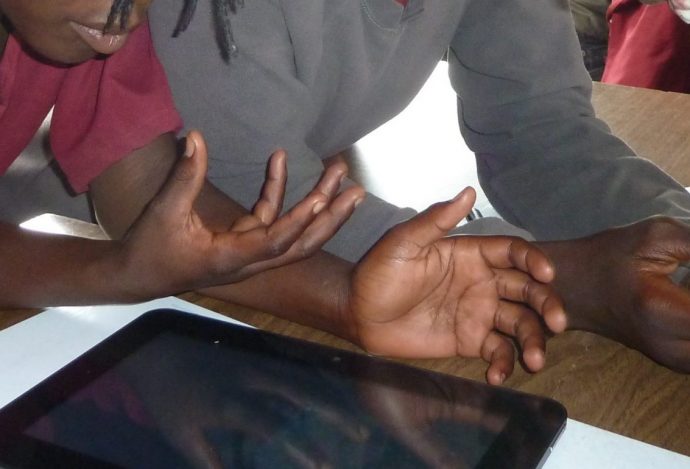A £20-million UK-funded research programme exploring the most effective uses of educational technologies in low-income countries is launched today by a consortium including several Hughes Hall Fellows based in the Faculty of Education at Cambridge.
The Educational Technology (EdTech) Research and Innovation Hub, funded by the Department for International Development (DFID) in partnership with the World Bank, brings together researchers, technology companies and education experts to identify the tech-based interventions that work best in poorer countries.
The consortium awarded the grant includes a team led by Dr Sara Hennessy, one of the six directors of the Hub. Other Fellows who are members of the Cambridge team include Dr Ricardo Sabates, Professor Rupert Wegerif, Dr Nidhi Singal and Dr Riikka Hofmann. The Hub will be housed in the Research for Equitable Access and Learning (REAL) Centre in the Faculty of Education.
The aim of the Hub is to create the largest global body of research on how EdTech is being used and how it can be improved, for the benefit of pupils, teachers and governments. The Hub will be closely aligned with the Bridge initiative at Hughes Hall through its focus on the impact of research on practice and policy – at national and regional levels.
One of the major challenges for education technology is that, while some governments and schools have focused on buying hardware and software, these tools are often not deployed as part of a joined-up wider initiative. Technology is often introduced into classrooms, for example, without opportunities for teachers to learn how to use it to support children’s learning. A glut of pilot projects means that any change is rarely sustained. The Hub instead aims for long-term, system-level change across whole regions.
Education systems in many developing and conflict-affected countries struggle to make progress on basic literacy and numeracy, and more than 380 million children worldwide will finish primary school without being able to read or do basic maths. The UN’s Sustainable Development Goal for education aims to ensure that, by 2030, all girls and boys complete free, equitable and quality primary and secondary education.
The EdTechHub, which will receive £20 million from DFID and run for eight years, is made up of the Overseas Development Institute, University of Cambridge, Results for Development, Brink, Jigsaw, Open Development & Education, Afrilabs, e-Learning Africa and BRAC.
Dr Hennessy said: “This huge investment and sustained commitment by DFID and partners to improving the educational opportunities for disadvantaged children in key low-income regions is extremely welcome.
“The University of Cambridge is very pleased to be involved in this pivotally important research programme that will make a real difference on the ground. The EdTechHub remit sends out a strong message in tune with our understanding that technology cannot just be parachuted in and magically transform lives. Effective engagement has to be long-term, strengthening communities of practice and supporting the most effective teaching and learning strategies.”
EdTech is also too often poorly designed for the context in which it is being used, frequently hindered by lack of infrastructure. All of this means that EdTech investments can be costly and yet not lead to much-needed educational improvement for children in disadvantaged regions. The Hub will take a critical perspective in assessing which digital and non-digital forms of learning are actually appropriate.
Dr Hennessy added: “Technology use has to be adapted to the cultural context and one-size-fits-all solutions simply don’t work. Rather than hoping for the best, we have to carefully review and iterate, generating insights from rigorous research and applying them in practice.”
As well as assessing the effectiveness of digital tools for pupils and teachers, the EdTechHub will provide a global platform for sharing ideas, effective practice and partnership among technology companies, investors and decision makers.
It will also develop a team that will work directly with users to test and tailor tools to the local context, and offer technical assistance to help international governments build up their knowledge and expertise on integrating digital education tools in their countries.
Links:
- The EdTechHub, #EdTechHub
- DFID announcement: https://www.gov.uk/government/news/uk-aid-funds-worlds-biggest-educational-technology-research-project
- Research Associate: http://www.jobs.cam.ac.uk/job/22229/
- Senior Research Associate: http://www.jobs.cam.ac.uk/job/22231/





